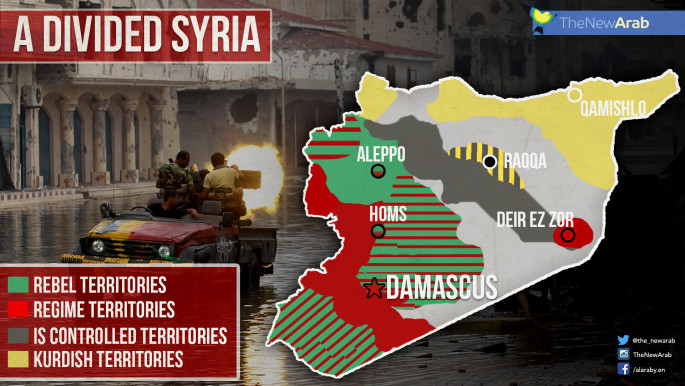Islamic State fighters edge closer to Turkish border
Militants from the Islamic State group have taken five villages from Syrian rebels close to the Turkish border.
2 min read
Syrian rebels have been tacking both IS and the regime in Aleppo [Getty]
Militants from the Islamic State group seized five villages from Syrian rebels close to the Turkish border on Wednesday, further weakening the rebels' foothold in the Aleppo area.
The UK-based Syrian Observatory for Human Rights, a network of activists monitoring the Syria conflict, said the extremist group took five villages in Azaz district, north of Aleppo, where rebels hold an enclave host to tens of thousands of internally displaced civilians.
The IS group's news agency also reported the advance.
Syrian rebels are anticipating a major government offensive against their position in Aleppo, Syria's largest city and once the commercial capital. Aleppo is now divided between government and rebel control.
Dozens of civilians have been killed in shelling and air raids on the city in the past week.
A government offensive backed by Russian air power and regional militias earlier this year dislodged rebels from parts of Azaz and severed their supply corridor between the Turkish border and Aleppo.
The predominantly Kurdish Syrian Democratic Forces (SDF), which is fighting for autonomy in the multilayered conflict, also made ground against the rebels.
That left the rebels in Aleppo with just one narrow corridor to the outside world, through Idlib province.
Those in Azaz are now squeezed between IS to the east and the SDF to the west and south, while Turkey tightly restricts the flow of goods and people through the border.
Doctors Without Borders and other aid organizations warned earlier this month that the humanitarian situation for more than 100,000 people trapped in the Azaz rebel-held pocket remained critical.
Wednesday's advance puts IS in a better position to strike the towns of Marea and Azaz.
Syria's conflict began with mostly peaceful protests in 2011, but a brutal government crackdown and the rise of an armed insurgency eventually plunged the country into a full-blown civil war.
The fighting has killed more than 250,000 people, according to the United Nations, which stopped tracking casualties several months ago.
The UK-based Syrian Observatory for Human Rights, a network of activists monitoring the Syria conflict, said the extremist group took five villages in Azaz district, north of Aleppo, where rebels hold an enclave host to tens of thousands of internally displaced civilians.
The IS group's news agency also reported the advance.
Syrian rebels are anticipating a major government offensive against their position in Aleppo, Syria's largest city and once the commercial capital. Aleppo is now divided between government and rebel control.
Dozens of civilians have been killed in shelling and air raids on the city in the past week.
A government offensive backed by Russian air power and regional militias earlier this year dislodged rebels from parts of Azaz and severed their supply corridor between the Turkish border and Aleppo.
The predominantly Kurdish Syrian Democratic Forces (SDF), which is fighting for autonomy in the multilayered conflict, also made ground against the rebels.
That left the rebels in Aleppo with just one narrow corridor to the outside world, through Idlib province.
Those in Azaz are now squeezed between IS to the east and the SDF to the west and south, while Turkey tightly restricts the flow of goods and people through the border.
Doctors Without Borders and other aid organizations warned earlier this month that the humanitarian situation for more than 100,000 people trapped in the Azaz rebel-held pocket remained critical.
Wednesday's advance puts IS in a better position to strike the towns of Marea and Azaz.
Syria's conflict began with mostly peaceful protests in 2011, but a brutal government crackdown and the rise of an armed insurgency eventually plunged the country into a full-blown civil war.
The fighting has killed more than 250,000 people, according to the United Nations, which stopped tracking casualties several months ago.
 |





 Follow the Middle East's top stories in English at The New Arab on Google News
Follow the Middle East's top stories in English at The New Arab on Google News


